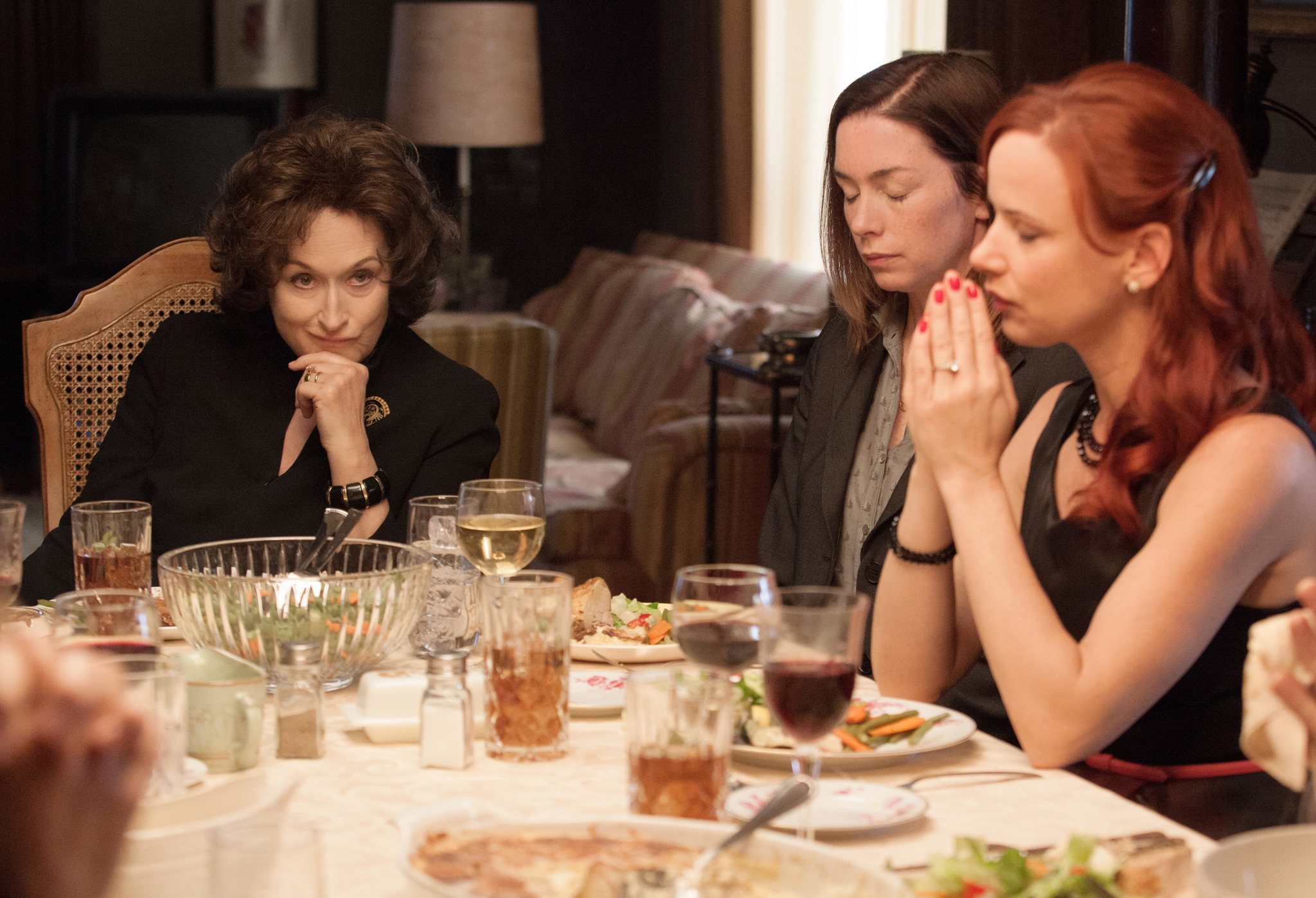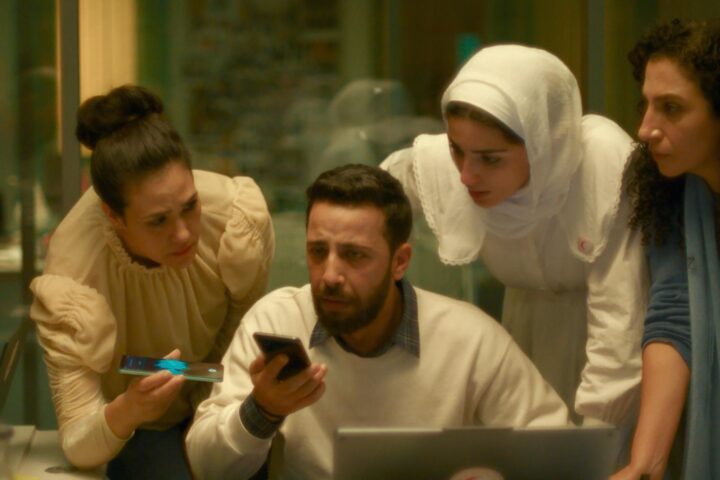On the Steppenwolf and Broadway stages, Tracy Letts’ Pulitzer Prize and Tony winning August: Osage County, a portrait of family turmoil to end them all, was a galvanizing experience—a three-act, 3 ½ hour showdown between estranged family members gathering on the sweltering Oklahoma plains for the funeral of their patriarch, the catalyst for a superfluity of dysfunction-tinged dust ups and revelations of long-obscured secrets. In a story that stood toe-to-toe with the best of Tennessee Williams (think about that one), Letts gave voice to a sprawling, disparate collection of unhappy characters in crisis—and then let them rip.
A botched reconciliation story between a caustic, cancer-stricken harridan of a mother and her embattled adult daughter, it was impossible to talk about the stage version of August: Osage County without mentioning its pair of Tony-nominated actresses, both of whom dug to their cuticles on Letts’ every line in an inextricable merger of piece and performance. Deanna Dunagan, who took home the Tony as the vicious Violet Weston, and Amy Morton, as beleaguered daughter Barbara, owned this show as much as Letts. Now comes the film adaptation, directed by television helmer John Wells (who also directed 2011’s The Company Men) as an intermittently satisfying and altogether acceptable derivation, which by all accounts with Meryl Streep at the helm should have brought down the house. It didn’t.
First let it be said that as matriarch Violet Weston, Streep gives a titanic performance of such rip snorting malice and, at times, pathos, that she all but sets this picture ablaze and lays waste to everyone. It’s thrilling to think that after nearly four decades onscreen, Streep is still at her peak, even if she sometimes runs rings around her latter-day screenplays (The Iron Lady, Julie and Julia) and directors (Mamma Mia!, Hope Springs). Her performance here as the pill popping crone to alcoholic husband and former famous poet Beverly (Sam Shepard, brief but effective), is wickedly funny, sardonic, imperious, iron-fisted, insecure, vulnerable and tremendously sad.
After Beverly’s unexpected death, the family gathering includes a collection of estrangements and resentments. For starters, eldest daughter Barbara (Julia Roberts), herself going through an unwanted divorce with her philandering, milquetoast husband (Ewan McGregor) has a decades old beef with mother Violet, who intimates that father Beverly never got over Barbara’s abandonment. Sniping Violet works overtime, chipping away at Barbara’s memory of her father, and the pair’s unabated volatility is temporarily defused by the funeral procession of the extended Weston clan.
The Weston siblings include two other daughters: plain, reserved Ivy (Julianne Nicholson), who stayed close to home and is now in her mid-forties; and boisterous, good-time girl Karen, delivered by a perfectly-cast Juliette Lewis as much-needed comic relief, a kindhearted but slightly dim Miami real estate agent addicted to men. Karen is accompanied by a flashy new beau, played with snake-oil by Dermot Mulroney, who takes an unnatural liking to Barbara’s fourteen-year-old daughter (Abigail Breslin), stuck in the middle and disillusioned with her mother.
That clan also includes Violet’s equally strong sister, Mattie Fae, played by the great Margo Martindale as a woman running from a past pain, making no attempt to mask obvious disdain for her own son, slow-witted Little Charles (Benedict Cumberbatch), who himself happens to be carrying on a clandestine love affair with cousin Ivy. It’s complicated. Also strong is Chris Cooper as Mattie Fae’s beleaguered husband, Charlie, who seems initially henpecked but eventually steps into the feud with everyone else.
The centerpiece of the film and its impressive raison d’être is a powerhouse, dinner table roundelay where hellcat Violet unleashes a torrential fury on the entire family, systematically deconstructing man, woman and child. It’s twenty minutes of sheer acting pleasure, and not a word has been changed from Letts’ play, the equivalent of detonating a bomb in the picture and family, shifting control from Violet to Barbara and creating a demarcation in the family and film—everything before, and everything after. Streep throws down the gauntlet here the cast nearly matches her, particularly Roberts, fully suggesting that the apple hasn’t fallen far from the tree, a realization that likely scares the hell out of her.
A Native American nurse named Johnna, well-played by Misty Upham (Frozen River), is also thrust into the melee, observing much and saying little. The freshness in Upham’s performance is that, unlike the cast of more broadly drawn characters, she isn’t required to do much more than watch and evaluate, and this directness works effectively in the closing scenes.
Of course, the other story here—one about telling the truth, and living truthfully, includes the removal of Violet’s plentiful medications, after which she reveals childhood scars inflicted by her own cruel, demonstrative mother, and the early hardships that formed her steely reserve, and that of sister Mattie Fae. There’s also a biting generational indictment from Violet about how easy her girls have had it, and how little they amounted to. Clearly Barbara is concerned that her own mother’s mordant genes could take root in herself, and while the play ended on a significantly darker note, the film version isn’t devoid of hope in a final scene that feels like a bit of a cop-out to the two preceding hours of doom.
John Wells’ August: Osage County maintains the spirit and integrity of Letts’ original, has been mounted with care and is undeniably well-acted, if more a sparring match than the knock-out punch of its source. Adapted by Letts and shaven of nearly ninety minutes and several ancillary characters, the streamlined movie version maintains the core characters and central mother-daughter battle royale, serving up its southern fried neuroses largely on the backs of its actresses, who are called upon to deliver the film (rather than its director, content to let the words and women do the heavy lifting). At times, it feels more like Crimes of the Heart than Long Day’s Journey Into Night; a big, fat series of confrontations and conversations missing some of the connective tissue.
I’ve spent much of this review contemplating the writing and performances, and they are the main reason to see August: Osage County; there’s certainly not much in the way of film sense and nothing particularly cinematic. It longs for a Mike Nichols, or Robert Altman, to take it to another level. And though the picture was capably shot by cinematographer Adriano Goldman, Wells unfortunately doesn’t “open it up” significantly to the Oklahoma plains, a missed opportunity to breathe. Consequently, much of the picture feels stagy and didactic—people, in rooms, talking. Repeat. But what great talk it is.
Engrossing as it sometimes is, the film version doesn’t seem to have much cumulative dramatic impact; it’s a sum-of-its-parts experience. Yet August: Osage County is a perfectly acceptable movie—and at times quite a good one—but given the screenplay and cast, greatness was within its grasp. And that makes its mere goodness, and this respectfully straightforward treatment, a tiny bit more bitter than sweet.
3 stars.



